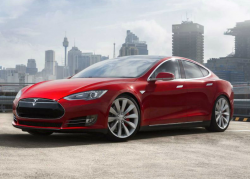
— A driver of a Telsa Model S in China is complaining after he said his car sideswiped a car on the side of the road while the Model S "Autopilot" was engaged.
Luo Zhen, 33, of Beijing, told Chinese authorities he hit the parked Volkswagen and did more than $7,000 damage to the Model S. Zhen said he thought Autopilot meant "self-driving" and accused Tesla of marketing the Model S as a self-driving car when it isn't.
Zhen was traveling behind another car when that car moved to the right to avoid hitting a car parked on the left. The parked car was partially in the highway, so the lead car gently swerved around it. But the Tesla sideswiped the parked car, allegedly with Autopilot engaged, and the driver took no action to avoid the collision.
Tesla cars make a driver activate Autopilot each time under the agreement the driver will keep their hands on the steering wheel and be prepared to take control at any time. And although China, like the U.S., hasn't figured out clear-cut autonomous driving regulations, current Chinese law does mandate a driver keep both hands on the wheel at all times.
The automaker has emphasized Autopilot is to "assist" a driver, not take control from a driver. If the computer doesn't sense a driver touching the steering wheel, a warning will be issued and if the warning is ignored, the car will slow down on its own.
A quick search online shows Tesla owners giving different time intervals for the "no hands" warning, with one owner saying they get warned if they don't touch the wheel every 15 seconds, and another owner saying they can go 15 minutes before a warning.
But Zhen says that's the problem because Tesla allegedly pushed the "self-driving" capabilities of the car. The dashboard camera caught the collision on camera (below) and it shows the car sideswiping the Volkswagen, something that could have easily been avoided if Zhen would have steered the car a little to the right.
However, Zhen said he was looking down at the time of the collision and was depending on Tesla's safety features to avoid a crash like his.
Chinese media talked to other Tesla owners who said salespeople for the company pushed the self-driving aspect and described the cars as being able to drive on roads without driver input. Zhen said the salesman even took his hands off the wheel and his feet off the pedals while demonstrating the Autopilot feature.
Turns out the same Chinese phrase used for "autopilot" in the airline world (zi dong jia shi) is the same phrase used in wording on Tesla's Chinese website, a phrase that best means, "self-driving."
Tesla Model S China Crash




